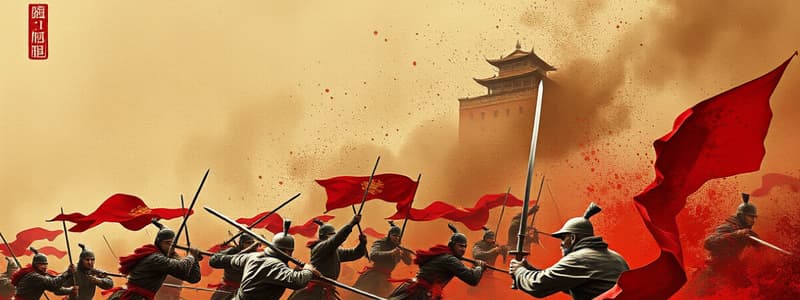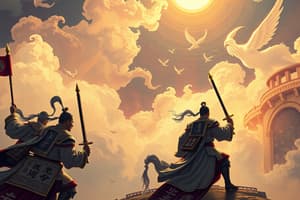Podcast
Questions and Answers
What are the Five Constant Factors?
What are the Five Constant Factors?
Things to be taken into account in one's deliberations, when seeking to determine the conditions obtaining in the field.
How does Sun Tzu define Moral Law?
How does Sun Tzu define Moral Law?
Causes the people to be in complete accord with their ruler, so that they will follow him regardless of their lives, undismayed by danger.
How does Sun Tzu define Heaven?
How does Sun Tzu define Heaven?
Signifies night and day, cold and heat, times and seasons.
How does Sun Tzu define Earth?
How does Sun Tzu define Earth?
How does Sun Tzu define The Commander?
How does Sun Tzu define The Commander?
How does Sun Tzu define By Method and Discipline?
How does Sun Tzu define By Method and Discipline?
What are the 7 Considerations to forecast victory or defeat?
What are the 7 Considerations to forecast victory or defeat?
What is all warfare based on?
What is all warfare based on?
How does Sun Tzu define the forms of deception?
How does Sun Tzu define the forms of deception?
If he is taking his ease...
If he is taking his ease...
Attack him where he is unprepared...
Attack him where he is unprepared...
If he is secure at all points...
If he is secure at all points...
If he is in superior strength...
If he is in superior strength...
In war, the great object should be...
In war, the great object should be...
How does the skillful leader win?
How does the skillful leader win?
What is hobbling the army?
What is hobbling the army?
What causes restlessness in the soldiers' minds?
What causes restlessness in the soldiers' minds?
What shakes the confidence of the soldiers?
What shakes the confidence of the soldiers?
What are the Five essentials for victory?
What are the Five essentials for victory?
How do the ancients define a clever fighter?
How do the ancients define a clever fighter?
His victories bring him...
His victories bring him...
How does the clever fighter win his battles?
How does the clever fighter win his battles?
When does the victorious strategist seek battle?
When does the victorious strategist seek battle?
How does the consummate leader control success?
How does the consummate leader control success?
How is the control of a large force the same in principle as the control of a few men?
How is the control of a large force the same in principle as the control of a few men?
Flashcards are hidden until you start studying
Study Notes
Five Constant Factors
- Key considerations in military deliberations determining field conditions.
- Important for strategizing and forecasting outcomes in warfare.
Moral Law
- Ensures unity between the ruler and the people.
- Fosters loyalty and courage, enabling followers to face danger without fear.
Heaven
- Represents natural elements: night, day, cold, heat, and seasons.
- Influences strategic planning based on environmental conditions.
Earth
- Encompasses geographical factors: distances, risks, security, terrain types.
- Impacts tactical advantages and decisions in military engagements.
The Commander
- Embodies qualities vital for leadership: wisdom, sincerity, benevolence, courage, strictness.
- The effectiveness of a commander directly affects the army’s performance.
Method and Discipline
- Involves organizational structure and hierarchy within the army.
- Essential for maintaining effective supply lines and managing military expenditures.
Seven Considerations for Victory
- Evaluates moral authority of sovereigns and abilities of generals.
- Considers geographical advantages, discipline, strength, training, and consistency in rewards.
Foundation of Warfare
- Based on the principle of deception.
- Success achieved through strategic misdirection and illusion.
Forms of Deception
- Techniques include feigning weakness, creating false impressions of movement, and misrepresentation of strength.
Engagement Strategy
- Maintain pressure on an enemy at ease to prevent complacency.
- Attack unexpectedly and prepare for adversaries' strengths.
Objective of War
- Primary aim is achieving victory as opposed to prolonging military campaigns.
Skillful Leadership
- Victory achieved through strategic intelligence rather than brute force.
- Capturing cities and dethroning rivals with minimal conflict is ideal.
Army Management
- Understanding capabilities of the army is crucial; orders must be appropriate to the situation.
- Mistakes in leadership can lead to significant disarray and loss of morale.
Five Essentials for Victory
- Knowledge of timing in battle decisions.
- Ability to manage diverse forces effectively.
- Unity of spirit among soldiers essential for cohesive action.
- Preparedness to exploit enemy vulnerabilities.
- Independence in decision-making from external interference.
Characteristics of a Clever Fighter
- Achieves success with ease while minimizing risks.
- True wisdom and courage recognized not through conquest but through strategic brilliance.
Certainty of Victory
- Winning battles through flawless execution leads to inevitable triumph.
- The victorious strategist anticipates and plans for victory before engagement.
Control of Forces
- Effective leadership and management principles apply equally whether commanding large or small units.
- Fundamental strategies remain consistent regardless of troop size.
Studying That Suits You
Use AI to generate personalized quizzes and flashcards to suit your learning preferences.




